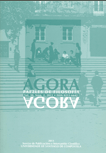THOUGHT EXPERIMENTS: THE EPISTEMOLOGICAL PROBLEM
Contenido principal del artículo
Resumen
Los experimentos imaginarios en física involucran cuestiones filosóficas tales como: ¿cómo podemos aprender del mundo por medio de pensar acerca de escenarios imaginarios? Filósofos realistas y empiristas confrontan esa cuestión desatendiendo que tales experimentos son sobre sistemas idealizados. Intentamos sostener que los experimentos imaginarios, debido a su propia naturaleza, no pueden proporcionar nuevo conocimiento ─enunciados verdaderos confirmados─ ni nuevos datos empíricos del mundo físico. Más bien, como Kuhn mantiene, su significación reside en mejorar nuestro aparato conceptual, permitiendo una nueva comprensión del mundo físico. Como caso de estudio, analizamos la paradoja Einstein, Podolsky y Rosen para dar soporte a esas aserciones. El tema nuevo propuesto en este artículo consiste en el estudio de esa paradoja a la luz de la concepción epistemológica de Kuhn de los experimentos imaginarios.
Palabras clave:
Detalles del artículo
Referencias
Aspect, A., J. Dalibard and G. Roger. (1982). "Experimental test of Bell´s inequalities using time-varying analyzers", Physical Review Letters, 49, 1804-1807.
Bell, J. S. (1964). "On the Einstein Podolsky Rosen Paradox", Physics, 1, 195-200.
Bohm, D. (1952). Physical Review, 85, 166 and 180.
Bohm, D. and Y. Aharonov. (1957). Physical Review, 108, 1070.
Brown, J. R. (1986). "Thought Experiments since the Scientific Revolutions", International Studies in the Philosophy of Science, 1, 1-15.
Brown, J. R. (1991). "A Platonic Account of Thought Experiments", en T. Horowitz and G. Massey (Eds.), Thought Experiments in Science and Philosophy, Lanham: Rowman and Littlefield, 119-128.
Brown, J. R. and Y. Fehige. (2019). "Thought Experiments", en Stanford Encyclopedia of Philosophy, 2019 Edition, Edward N. Zalta (ed.). https://plato.stanford.edu/entries/thought-experiment.
Einstein, A., B. Podolsky and N. Rosen. (1935). "Can Quantum-Mechanical Descriptions of Physical Reality Be Considered Complete?", Physical Review, 47, 777-780.
Gendler, T. S. (2000). Thought Experiment. On the Powers and Limits of Imaginary Cases, New York and London: Garland Publishing.
Horowitz, T. and G. Massey (Eds.). (1991). "Introduction", en Thought Experiments in Science and Philosophy, Lanham: Rowman and Littlefield.
Kuhn, T. S. (1964). "The Function of Thought Experiments", reprinted in T. S. Kuhn, The Essential Tension, Chicago: Chicago University Press, 1977, 240-265.
Kuhn, T. S. (1970). The Structure of Scientific Revolutions. (2ª edition). Chicago, Chicago University Press.
McMullin, E. (1985). "Galilean Idealization", Studies in the History and Philosophy of Science, 16(3), 247-273.
Norton, J. D. (1991). "Thought Experiments in Einstein´s Work", en T. Horowitz and G. Massey (Eds.) Thought Experiments in Science and Philosophy, Lanham: Rowman and Littlefield, 129-148.
Norton, J. D. (1996). "Are Thought Experiments Just What You Thought?", Canadian Journal of Philosophy, 26(3), 333-366.
Nowak, L. (1992). "The Idealizational Approach to Science: A Survey", en J. Brzezinski and L. Nowak (Eds.), Idealization: Approximation and Truth, Amsterdam/Atlanta: Poznan Studies in the Philosophy of Science and Humanities, vol. 25, 9-63.
Peacock, K. A. (2018). "Happiest Thoughts. Great Thought Experiments of Modern Physics", en M. T. Stuart, Y. Fehige and J. R. Brown (Eds.), The Routledge Companion of Thought Experiments, New York: Routledge, 211-242.
Reiss, J. (2018). "Thought Experiments and Idealization", en M. T. Stuart, Y. Fehige and J. R. Brown (Eds.), The Routledge Companion of Thought Experiments, New York: Routledge, 469-483.
Rolleri, J. L. (2013). "Idealized Laws and Explanatory Models", Teorema, Vol. XXXII/2, 5-27.
Sorensen R. A. (1992). Thought Experiments. New York and Oxford: Oxford University Press.
Stuart, M. T., Y. Fehige and J. R. Brown (2018). "Thought Experiments. State of the Art", en M. T. Stuart, Y. Fehige and J. R. Brown (Eds.), The Routledge Companion of Thought Experiments, New York: Routledge, 1-28.
Uҁar, S. (2019). "General Features and Problems of Thought Experiments Used in Physical Sciences", en V. Kamer (Ed.), IX Mantik Salisstayi Kitabi, Instambul: Mantik Derne Gi Yayinlari, 445-463.
Van Dyck, M. (2003). The Roles of One Thought Experiment in Interpreting Quantum Mechanics. Werner Heisenberg meets Thomas Kuhn. Philosophica, 72, 79-103.
Weisberg, M. (2007). "Three Kinds of Idealization", Journal of Philosophy, 104, 639-659.
Artículos más leídos del mismo autor/a(s)
- José Luis Rolleri, Invariance, symmetry, and lawfulness , Agora. Papeles de Filosofía: Vol. 38 Núm. 2 (2019)







